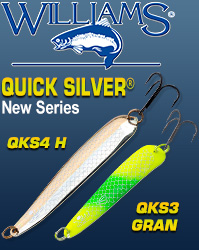TO FLOAT WITH THE WOLF ... Gentle river, tradition make night memorable
By Dick Ellis
A full moon showed the way along the many turns of the Wolf River and the gentle hum of John Faucher’s small outboard briefly intruded on a perfect night near New London. The jonboat, guided by Faucher’s hand on the tiller, had taken the same journey downriver on countless nights; past a surprising wilderness setting so close to so many people, past the floating rafts not yet pulled by fishermen not yet ready to give up on great fishing, to finally settle against one floating castle.
A man’s home is his castle, no matter how big or small .John Faucher’s raft has a modest feel, despite the bunk beds inside the dwelling constructed on the deck board platform, despite the propane gas heater, the stove and small desk and windows where an angler can sit and by lantern light keep a diligent eye on cane poles waiting to bounce under the weight of another walleye. But it is also Faucher’s home away from home, as often as he can make that happen. It is his castle, and people from 20 different countries have spent the night here; waiting for the rods to talk, and listening too to one man’s pride at having carried on a tradition that is more about family and friends and less about catching fish.
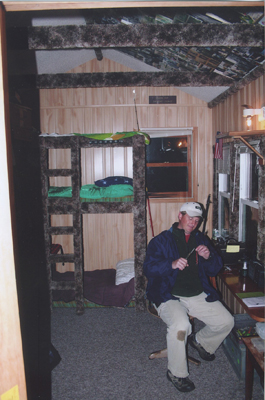 |
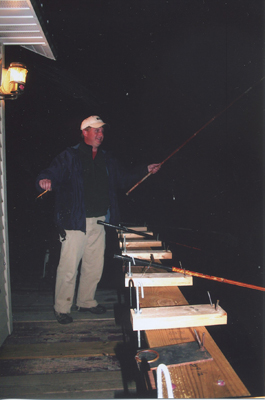 |
| Bunk beds, warmth and all the other comforts of home greet visitors to John Faucher’s raft when fishing the Wolf River near New London. Rafts are a long-standing tradition on the Wolf River system. | John Faucher of New London sets cane poles on his raft on the Wolf River near New London to begin a full night of fishing targeting post-spawn walleyes. Channel cats were also cooperative. |
Thousands of Wisconsin residents travel to the Wolf to participate in its spring walleye or whitebass runs, or to fish year-round on the hundreds of thousands of acres that make up the Winnebago Chain and connecting waters. Boat anglers, according to Faucher, catch many more fish than do the raft fishermen. The tradition of raft fishing, though, still lives, after being born in the post-World War II era as a few pioneers built docks and began to float them on the river on telephone poles. That evolved to more participants building more elaborate rafts, stricter regulations, and the sleeping quarters of all shapes and sizes seen scattered and moored along miles of river bank today.
Anglers can secure their raft off of their own property in the river current after first ice with ropes, cables and vertical pipes or off of property rented from farmers or other landowners. Each river township along the Wolf also requires a permit to place a raft, usually for $15.00 to $20.00 per season, Faucher said. The rafts by law must be off the river by October 31, but most pull their rafts after the spring spawning runs. Faucher is part of a minority who fishes the river from his raft into fall, and he believes some of the best fishing occurs during the summer months. He is also living the rafting lessons passed on from people for whom he has the most respect.
“I was blessed to be born into a very good thing,” he said. “My dad (Tom Faucher) has always been the one to give the best to my two brothers or me, like the tree that you just know a nice buck is going to walk by. My great uncles, Bill, Roman, Joe and Johnny Muskevitch, were raft fishermen, a true band of brothers. My dad used to work on a farm on this stretch of river and fish from shore. When he married mom they taught him to raft fish. He has been taking us on his raft since we were little kids. He helped me build my own rafts properly and showed me how to secure it so there are no problems.”
In the strong river current, problems can too easily occur if rafts are not secured properly. The need to keep the river clean and safe has also meant that rafters are strictly regulated. Floatation barrels, for example, cannot have contained any pollutant or other material harmful to the river or must be sterilized prior to use. Eighteen 55-gallon barrels that long ago held pineapples now hold up Faucher’s 16 by 20 foot raft.
“One 50-gallon food grade drum or metal barrel translates to 600 pounds of buoyancy,” Faucher said. “Each barrel must be marked with a number like a social security number. If you lose a barrel it’s a pretty stiff fine. A river clean-up crew will find a barrel and if it is unmarked they will do everything they can to track down the owner.”
Following our moonlit run up the Wolf past many other rafts, none of which showed any sign of occupancy on this evening, we docked upstream of Faucher’s raft, with the current pressing the small boat against the wooden deck. After securing the boat, we settled in and began setting the four cane poles of various lengths for walleyes and two rods targeting bottom holding channel cats. Our position was 43 miles up-river from the mouth of Lake Poygan, which Faucher labeled “one of the best lakes in Wisconsin” and the other Lower Wolf River Lakes of Winnebago and Butte des Morts. Sixty river miles twisted and turned above us to the dam at Shawano.
“Dock fishing on the river with cane poles is a lot like trolling except the current moves the lures instead of the baits being pulled by the movement of a boat,” he said. “We use various length poles staggered at different depths with different length lines and sizes of weights.The angle of the dock or raft in relation to the current and shore is also important in preventing tangle up. If you are parked at too much of an angle all of your lines end up in the same spot, much like when you’re trolling and make too sharp of a turn. The other factor in angles is when you are bringing in a fish on a cane pole. You want the fish to swing in toward the dock so you can get it in the net without tangling up the other lines. That can be difficult in the swift spring currents. Because we use different artificial lures in the `back run’, (as fish in post-spawn migrate back to the lakes) having enough current is a key factor. When the current diminishes and it’s not enough to work the lure, I usually switch to a night crawler harness.”
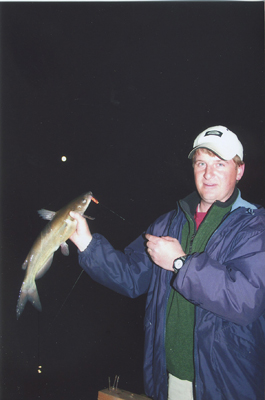 |
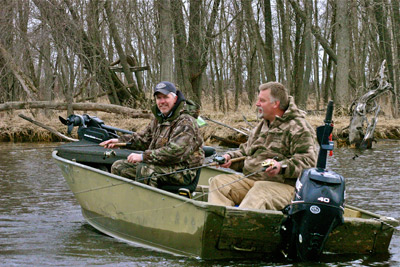 |
| Channel cats were regular visitors to stink bait set on the bottom off John Faucher’s raft during a night of fishing on the Wolf River in May. Faucher has good fishing on the river long after the spring run concludes. | This stringer of channel cats and walleyes shown by John Faucher of New London were kept after a full night of fishing from a raft on the Wolf River. Other fish were released or lost during the fight. |
Well into the wee hours, we experienced very good walleye action with fish that stung Rapalas or Smithwicks. Three channel cats also visited. Some of the fish were lost, some were released. Three walleyes and three cats were eventually divided up for the frying pan. With a reporter eventually asleep on a top bunk, the host continued on occasion to run to another bouncing rod, under a full moon, on a floating paradise. One man’s castle if you will.
“The best fishing and solitude out here will be through the rest of May and June,” Faucher said. “I’ll be using this thing until October 31st. Hundreds of people still raft fish but it is a dying tradition. It’s a lot of work and sometimes a lot of money. You can catch more fish from a boat. But this is more about family and friends. You hear so many bad things in life today but along this river, if you break something, the next thing you know someone has left a new piece of equipment on your dock. These are good people. When I’m out here I feel closer to God.”



